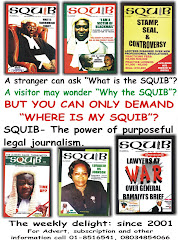THE LEARNED SQUIB
This piece ought to have been published last week. But I never did, simply because I forgot to write it. Instead what I wrote and published was: “The 6 virgins.” Don’t mind me. I am no virgin myself.
So what is activism? Before we answer this question, let us know the position of the Chief Judge. According to Alabi C.J, the bar or the bench is not a place for anybody to practice activism. Activism according to the Chief Judge may be good on the pages of a newspaper, on the television but, it is not acceptable in the legal profession.
From the Chief Judge’s statement, it appears that whereas a journalist can be an activist, a lawyer or a judge should not be.
So who is an activist? What is activism? And why is it that activism is proper in journalism but is improper in the legal profession?
Activism, or social activism, to my mind, is an individual or group’s reaction to a state of affairs in any community, with a view of making same better, or eradicating it, if an evil, by way of specific moves to achieve the objective.
Social changes can be effected in two main broad ways - peacefully or martially. The peaceful means include discussions, negotiations, mediations, litigations etc., while martial means may range from mild confrontation modes such as street demonstrations, rallies, petitions, strikes and boycotts to high confrontation modes such as military sabotage, assassinations, kidnappings, fights, unrests, shoot-outs and ultimately wars.
An activist, contrary to facile understanding is not a trouble-maker or a criminal. He is a challenger of a set of social, economic, even political relations in society, considered inimical to the progress of the society or to the progress of a section of society. Unfortunately, adversaries of activists don’t see any good in them because they fail to appreciate the goals of the activists. That is why it is said; ‘one man’s liberation fighter is another man’s terrorist.’
An activist, a genuine one only wants a better society that he met or lived in. If this is true, why should activism be an anathema in the legal profession?
We all know that the legal profession is not in the pristine state of paradise. There are so many warts all over it. Corruption, inefficiency and of course injustice are very well established in the bosom of the legal profession in Nigeria.
Now how can such a profession be made better, if the wish of Honourable Justice Alabi should prevail?
According to Justice Alabi, the legal profession is conservative and tradition bound - but what exactly does that mean? Does it mean that such a profession is perfect and is it a crime to make criticisms in such a profession?
I cannot find myself in agreement with the Chief Judge. One may tolerate his lordship’s position a little if his position is that efforts at making the legal profession better should not take a violent or martial turn. But to say that criticisms of a sorry state of affairs or peaceful engagements such as frank discussions and bold revelations of misdeeds in the profession are improper, is in fact an extreme and violence-inspiring position to hold.
True activists are really gems that society should appreciate and revere. They are Benthamites who sacrifice their time, resources, comfort and even risk their lives to ensure that it is a better society they left than they met.
Activists demand for ideals and virtues in society. If according to Alabi C.J they have a place in a profession like journalism, why should they be outcasts in the legal profession and justice sector?
My Election 2011 Experience
A warm & witty account of the 'Tiger Monitors' at the Election 2011 Elections at:
http://learnedsquib.blogspot.com/2011/05/tiger-monitors-by-adesina-ogunlana.html
http://learnedsquib.blogspot.com/2011/05/tiger-monitors-by-adesina-ogunlana.html
CHIEF G.O.K AJAYI SAN
| Chief G.O.K Ajayi SAN My father in the legal profession is gone; one of the angels sent by the almighty God to protect the Squib Law Magazine and quest for integrity in the legal profession is gone. He was an unbelievable rock of such magnitude that the Squib trial of ten years (2003 – 2013) was sweet instead of sorrowful. Where would I find such a father again? We hope to exceed your standard of gracious and sacrificial generosity to the weak and to the poor. Daddy 3, Rest In Peace ADIEU, ADIEU, ADIEU. http://learnedsquib.blogspot.com/2008/01/memoirs-of-daddy-3-by-adesina-ogunlana_15.html
Bottom of Form Top of Form
Bottom of Form |
How shall we educate the Nigerian?
NBA IKEJA PRESS RELEASE ON THE N97 FUEL PRICE AT:
The Good people of Nigeria.
The Nigerian Bar Association Ikeja Branch strongly and unequivocally disassociates itself from the recent announcement of the suspension and truncation of the protest
READ MORE AT: http://www.nbaikejapressrelease.blogspot.com
The Nigerian Bar Association Ikeja Branch strongly and unequivocally disassociates itself from the recent announcement of the suspension and truncation of the protest
READ MORE AT: http://www.nbaikejapressrelease.blogspot.com
MY FUEL PRICE HIKE PROTEST DIARY BELOW AT:
Squib Health
The Story of the Squib
catchup on facebook
'How To Know A Good Web Designer For Your Chamber Site'
Click on: http://www.e-lawyering.blogspot.com to access
*Check out Fawehinmiism 2010 at:
http://www.squibcoverstory.blogspot.com
*Check out Fawehinmiism 2010 at:
http://www.squibcoverstory.blogspot.com
...no business being at big competitions like Africa's Nation's Cup or the World Cup...
More at :
http://www.squiblogg.blogspot.com
More at :
http://www.squiblogg.blogspot.com
naija reflections...
follow me on twitter:
visitors
*Anger over Law School's N300,000 fee
ROOF top tuition of N300,000 for new intakes into the Nigerian Law School may soon shut the door of the legal profession to many Nigerian families.
The fees were raised twice in the past five years. The 2004/2005 law students paid N150,000, half of what the new intakes are now being asked to pay, while the last set paid N220,000.
The latest increase had earlier been foretold by the institution’s Director-General, Dr. Mamman Tahi, during the 2008 Call-to-Bar ceremony.
He had disclosed that the fees for new intakes into the school would be increased from the N220,000 paid by the last set.
Already, some Nigerians have bared their minds on the consequences of the tuition, required of new intakes into the Nigerian Law School.
Many parents, who spoke separately in Bwari (FCT), during the Call-to-Bar ceremony on Tuesday, called for a drastic reduction.
A medical doctor, Dr. Femi Agboola, whose son was among the graduands, described the new fee of N300, 000 “as exorbitant and does not reflect present day reality in the country”.
“The fee charged by the law school is becoming unbearable to the ordinary Nigerian. Where do they expect a civil servant or a farmer to find N300, 000 to pay for his child or ward who qualifies to attend this school?” he asked.
According to him, without the intervention of the Federal Government, law graduates from poor background may not be able to attend the school.
Hajia Safia Abba, whose daughter was also called to bar at the ceremony, criticised the new fee.
Her words: “It is ridiculous. Apart from the expensive books these children buy, the high fees will discourage our children from reading law.”
The fees were raised twice in the past five years. The 2004/2005 law students paid N150,000, half of what the new intakes are now being asked to pay, while the last set paid N220,000.
The latest increase had earlier been foretold by the institution’s Director-General, Dr. Mamman Tahi, during the 2008 Call-to-Bar ceremony.
He had disclosed that the fees for new intakes into the school would be increased from the N220,000 paid by the last set.
Already, some Nigerians have bared their minds on the consequences of the tuition, required of new intakes into the Nigerian Law School.
Many parents, who spoke separately in Bwari (FCT), during the Call-to-Bar ceremony on Tuesday, called for a drastic reduction.
A medical doctor, Dr. Femi Agboola, whose son was among the graduands, described the new fee of N300, 000 “as exorbitant and does not reflect present day reality in the country”.
“The fee charged by the law school is becoming unbearable to the ordinary Nigerian. Where do they expect a civil servant or a farmer to find N300, 000 to pay for his child or ward who qualifies to attend this school?” he asked.
According to him, without the intervention of the Federal Government, law graduates from poor background may not be able to attend the school.
Hajia Safia Abba, whose daughter was also called to bar at the ceremony, criticised the new fee.
Her words: “It is ridiculous. Apart from the expensive books these children buy, the high fees will discourage our children from reading law.”
Click below to read Mr Squib's Snoop Log:
NBA NEC MEETING IN SOKOTO PICTURES
CHECK OUT NBA NEC SOKOTO MEETING PIX BY CLICKING ON YELLOW LINK BELOW:
http://www.squibsociety.blogspot.com
http://www.squibsociety.blogspot.com

'Learned Squib' visitors are from:
Labels
- 'Bad Seniors' (1)
- 'Great Shock' (1)
- 'Judges (1)
- A Lesson From Agbako (1)
- A query for Pastor Dele Adesina (1)
- abe-igi chambers (1)
- Abuja (1)
- Action please (1)
- activist (1)
- agbero (1)
- all men equal (1)
- B.P.A.N not S.A.N (1)
- Bar elders demoncrazy (1)
- barrister (1)
- Barrister Egonu (1)
- Chief Judge (1)
- Chief Judge Lagos State (1)
- Chief Judge of Nigeria (1)
- Chief Magistrate Adedayo (1)
- conference materials (1)
- daddy 3 (1)
- decency (1)
- Dele Adesina (1)
- deposing to an Oath (1)
- discipline (1)
- don't clean (1)
- don't rock boat (1)
- elevation (1)
- equally (1)
- Etiquette for lawyers (1)
- expired terror (1)
- fallen standards (1)
- fit (1)
- FRA Williams Bar Centre (1)
- Gagging A President (1)
- golden albert (1)
- Golgotha (1)
- Grass to SAN (1)
- hang around (1)
- health (1)
- honorary titles (1)
- hot seat (1)
- hurray the squib is ten (1)
- Ilorin (1)
- In memoriam Abija (1)
- israelite journey (1)
- Jadesola Akande (1)
- judges (1)
- judges present (1)
- judicial juggernaut (1)
- Judicial Staff Union of Nigeria (1)
- judiciary staff (2)
- justice (1)
- justice of the textbook (1)
- JUSUN (2)
- know thyself (1)
- Kutigi CJN (1)
- Lagos Judiciary (1)
- Lagos lawyers (4)
- Lagos State High Court Judges (1)
- Lagos State Judiciary (1)
- Lagosian (1)
- landmark ruling (1)
- LASTMA killer (1)
- lawyer (1)
- lawyers' new year resolutions (1)
- lawyers'conference (1)
- legal profession (1)
- let establishment be (1)
- National Executive Council meeting (1)
- new law (1)
- new secretariat (1)
- Nigerian Bar Association (1)
- Nigerian Law School (1)
- Nigerian legal authorities (2)
- nigerian police (1)
- nigerians make heaven (1)
- Now that the Race is on again (1)
- oath of office (1)
- olorunnimbe j (1)
- PDP carnival rally (1)
- pollutants (1)
- sacred (1)
- Security Marshalls (1)
- Senior Advocate of Nigeria (1)
- shouting match (1)
- Something Better Than Death (1)
- strike (2)
- Styles and Choices' (1)
- suspects (1)
- swallow slime (1)
- the coup of a bar man (1)
- the killer tree case (1)
- torture (1)
- trial (1)
- unusual bail (1)
- uppercrustism (1)
- when guns boom (1)
About Me

- squiblog
- Adesina Ogunlana was bornJuly 27,1964. 1981-85,he read English at Unife where he also wrote ‘Junior on Sunday.’ Between 1985-1986, he did his NYSC at Kazaure, thereafter reading law at LASU. He was Legal Secretary Students Union,1992-1994. For his role in students' protests, he was expelled but reinstated after challenging it. He thereafter proceeded to the Nigerian Law School and was called to Bar,1996. He started his law firm in year 2000and started publication of the SQUIB, in year 2001. SQUIB staff were beaten and detained numerous times but Ogunlana remained undaunted. He was Welfare Secretary, Ikeja NBA andmember of NEC 2008-2010. He was Gen.Sec.of the Ikeja Branch and NEC Member, 2010-2012. He was Vice-Chairman, 2014 -2016 & Chairman of the Ikeja Branch 2016 -2018. At National level, he was Assistant Sec. of the LOC of the AGC of the NBA 2009. He was also the Sec. of the LOC of the AGC 2017 in Lagos and NEC Co-opted Member of the NBA in 2018. Apex of the struggles was the one against the Land Use Charge imposed by Governor Akinwunmi Ambode. In 2021, he was Lead Counsel to EndSARS petitioners.











No comments:
Post a Comment